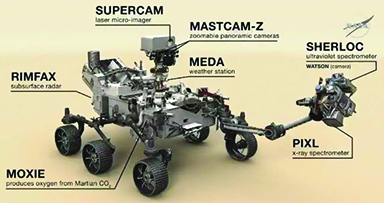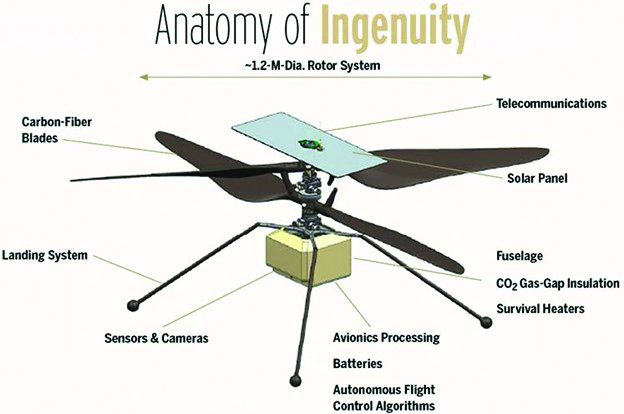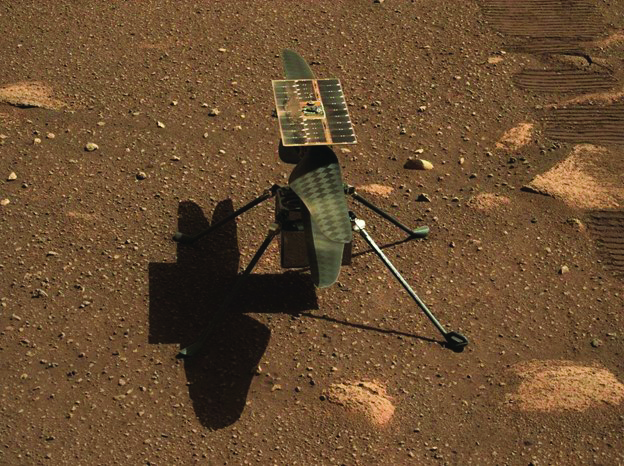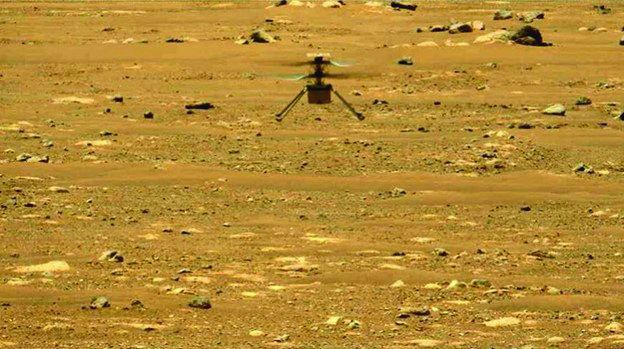It has been an exciting few months on Mars!
NASA’s latest Mars rover, Perseverance, landed on February 15th.
For those not keeping track, Perseverance is NASA’s fifth Mars rover. The first, Sojourner, landed in 1997. It was about the size of a microwave oven.
The twin rovers Spirit and Opportunity, about the size of golf carts, landed on opposite sides of the planet, in January of 2004.
Curiosity, the fourth Mars rover, was as big as a small SUV. It landed on Mars in August of 2012, and is still operating.
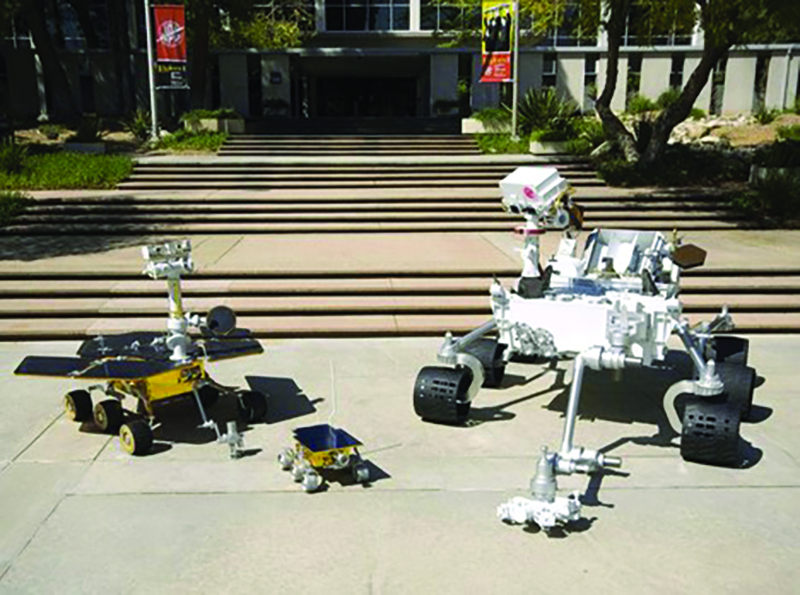
The latest rover, Perseverance, landed on Mars on February 15, 2021. Like Curiosity, it is the size of a small SUV.
This latest rover had a special innovation: tucked away in a compartment in its belly was another vehicle named “Ingenuity”.
Ingenuity is a helicopter.
Ingenuity’s sole purpose is to demonstrate that powered, controlled flight on Mars is possible. Ingenuity weighs four pounds, and the blades of its twin rotors span four feet.
Ingenuity was powered and protected from the severe cold of Mars nights by Perseverance until it was detached and unloaded onto the ground. Once on its own, the first test was to assure that its solar cells would store enough power in its batteries during the day to keep it warm each night, when temperatures can reach as low as minus 220 degrees. Tests on Earth showed that should be the case, and Ingenuity passed its first test. Then it was on to its intended purpose: powered, controlled flight on Mars!
But the atmosphere on Mars is very thin. It would be like flying on Earth at 100,000 feet. The highest altitude any Earthly helicopter has ever flown is about 40,000 feet. Ingenuity was engineered and tested extensively to meet flying conditions in such thin air as no helicopter has ever encountered on Earth.
If successful, Ingenuity would be the first vehicle to fly on another planet. The significance of that achievement was not lost on NASA. The project engineers requested a small piece of the fabric from the wings of the original Wright Flyer, which first flew in 1903 and is now resting in the Udvar-Hazy Air and Space Museum. A square inch of the wing fabric from the first manned airplane was carried along in Ingenuity on its Mars flights.
First Flight – April 19, 2021
Ingenuity was successful on its historic first flight. It ascended to an altitude of ten feet, hovered for thirty seconds, and then descended to a perfect landing.
The Perseverance rover was parked 211 feet away, to film the flight and receive data sent by Ingenuity for analysis – particularly if anything went wrong. Take-offs and landings are the toughest part of any flight, and Ingenuity had done both very well.
Second Flight – April 22, 2021
Ingenuity’s second flight began with an ascent to an altitude of sixteen feet. After a brief hover, Ingenuity then tilted sideways five degrees, to begin a horizontal flight that lasted for seven feet. There it hovered once more, making turns to point its camera in several different directions.
That done, once more it tilted sideways five degrees, now heading back the seven feet to its original location. From there, it again descended and landed. The total flight time was 51.9 seconds.
Third Flight – April 25, 2021
On the third flight Ingenuity stretched its wings. The flight again began with an ascent to a height of sixteen feet, but Ingenuity then flew 164 feet from where it took off, at a speed of 6.6 feet per second (about 4.5 miles per hour). As before, it then returned to its take-off point, and landed, for a total flight time of eighty seconds.
Fourth Flight – May 7, 2021
Ingenuity’s fourth flight again set several new records. It flew south 436 feet and then back, for an 872-foot round trip, again at sixteen feet. Flight time was 117 seconds, another record. That southern flight was along the planned first leg to be taken by the Perseverance rover, so its photographs expanded the knowledge of what Perseverance would encounter.
As with every flight, the project team was thrilled. Ingenuity has met every hoped-for milestone, and more.
Fifth Flight – May 7, 2021
Only five flights were originally planned for Ingenuity. Perseverance, the rover, acts as a relay for any instructions to be sent to Ingenuity, and for any data collected by Ingenuity that is to be sent back to Earth for analysis. But Perseverance has its own assignments and goals; it was time for Perseverance to leave, and move on to explore and get started on its own research.
With the third flight, Ingenuity had basically achieved all its goals. Its mission was done. But nobody wanted to leave a perfectly good working helicopter to just sit on the ground.
The decision was made to use Ingenuity, as long as it continues to operate, and at least until the end of August. To that end, its fifth flight was a one-way trip. Flying at a new altitude record of thirty-three feet, Ingenuity flew 424 feet and landed after a flight of 108 seconds. There it will wait for Perseverance to make its own way, to begin its intended research.
Sixth Flight – May 22, 2021
Ingenuity’s sixth flight was intended to showcase the scouting potential it makes possible. But a software problem caused an “in-flight anomaly”.
According to NASA, Ingenuity was programmed to climb to an altitude of 33 feet before heading 492 feet to the southwest at a ground speed of nine miles per hour (about 13 feet per second). At that point, it was to turn southward and continue another 49 feet while taking photographs toward the west. Finally, it was to fly another 164 feet to the northeast, and land.
The first leg of the flight was fine. But toward the end of that leg, Ingenuity began adjusting its velocity and tilting back and forth. That behavior continued throughout the rest of the flight. Onboard sensors indicated the rotorcraft encountered roll and pitch changes of more than 20 degrees, over-controlling inputs, and spikes in power consumption.
There is no GPS on Mars. To guide it in choosing where to fly, Ingenuity uses an inertial reference device and cameras that reference images of the ground beneath it. But about 54 seconds into the flight, the software mis-coordinated the times when the camera images were made – the photos’ timestamps were incorrect. Ingenuity was getting mixed up about where it was.
Surviving the anomaly
Despite encountering this anomaly, Ingenuity was able to maintain flight and land safely on the surface within sixteen feet of the intended landing location. Considerable effort went into ensuring that the helicopter’s flight controls would tolerate significant errors without becoming unstable. That built-in margin came to the rescue in flight six.
Also, Ingenuity’s flight controls were designed to stop using navigation images during the final descent prior to landing. That design paid off: nearing the ground, Ingenuity stopped oscillating, leveled its attitude, and touched down just as it is supposed to.
Looking at the bigger picture, while the flight uncovered a timing vulnerability that will now have to be corrected, it also confirmed the robustness of its workings in multiple ways. NASA now has flight data probing the outer reaches of how a helicopter performs in Martian atmosphere and gravity, which greatly expands the amount of knowledge about flying helicopters on Mars.
Ingenuity’s story has not reached its final chapter. The project is not yet finished, and that is terrific news. But what has happened in Ingenuity’s first six flights alone will be a remarkable foundation for future flights on Mars – and someday, for flights on other worlds as well.
All photos courtesy of NASA and the CalTech Jet Propulsion Lab.■

